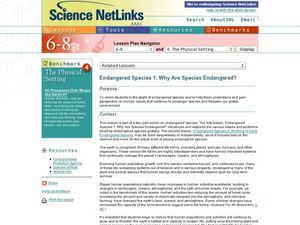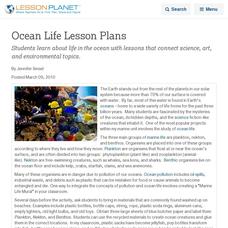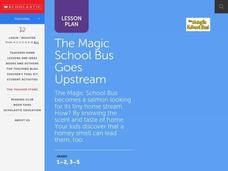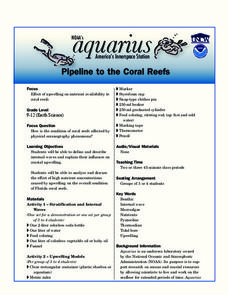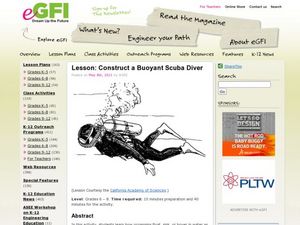Curated OER
Marine Life, Oceans, Lakes and Rivers
Students examine the types of organisms found in oceans. In groups, they read articles about the research done at certain sites. They work together to research their own water ecosystems and report the findings to the class. To end...
NOAA
What's the Big Deal?
Who knew that a possible answer to Earth's energy resource problems was lurking deep beneath the ocean's surface? Part four of a six-part series introduces Earth Science pupils to methane hydrate, a waste product of methanogens. After...
Curated OER
Endangered Species 1: Why are Species Endangered?
Emerging ecologists examine endangered species by visiting the US Environmental Protection Agency website. They consider human contribution to the decline of different species. They research an endangered animal and then craft a poster...
Scholastic
Study Jams! Earth's Oceans
Enjoy beautiful images and ocean facts together with the slide show, then see how much you absorbed by taking the quiz. Some of the topics covered in the presentation include water pressure, sunlight in the ocean, the names and locations...
Curated OER
Lesson Plan fo The Magic Eyes of Little Crab
Interested in a "how and why" story to read with young young scholars? In this storytelling lesson, readers will discuss sea creatures, focusing on practicing new terminology through retelling the story. This resource provides a list of...
Curated OER
Ocean Life Lesson Plans
Students learn about life in the ocean with lessons that connect science, art, and environmental topics.
Curated OER
Melted Oceans Lesson Plan
Students use melted crayons to mix and blend into ocean in motion scenes. They choose colors that they see in ocean water, melt the crayons, and swirl the wax into designs on white construction paper. They finish the artwork by letting...
Curated OER
Ocean Careers Exploration
Learners will work together in groups to gather information about careers in oceanography. They discover the need to have a diverse group of people on a team and then share their information with the class. Web links and materials are...
PHET
Planet Designer: Martian Makeover
Mars used to have liquid water, can you make it come back? Use the instructional activity and simulation to understand why Mars lost its magnetic field, why atmosphere is important, and what gravity has to do with it. This is the third...
Curated OER
Capitals, Oceans, And Border States
Students investigate geography by completing games with classmates. In this United States of America lesson plan, students examine a map of North America and identify the borders of Mexico and Canada as well as the Pacific and Atlantic....
Curated OER
Lesson Plan on Latitude and Longitude
Sixth graders identify at least ten places on the world map using given longitude and latitude points. They identify the longitude and latitude of ten places on the world map.
Curated OER
Oceans: A Sensory Haiku
Students create an ocean haiku. In this haiku lesson, students use their five senses to write a haiku. Students watch videos about the ocean, make a sensory portrait, and create a class haiku.
Curated OER
The Magic School Bus Goes Upstream
Young scholars learn along with Ms. Frizzle's class. In this Magic School Bus lesson plan, students travel upstream to discover how, like salmon, a homey smell can lead them, too.
Curated OER
Sustainable Marine Fisheries
Through a fishing simulation, environmentalists discover consequences of over fishing. Afterward, they discuss how the activity relates to the impact of real-life commercial fishing. They also consider sustainability in the fishing...
Curated OER
Underwater Mountains & Trenches
Students determine Earth's deepest trench, outline continents, major ocean mountains, and trenches on color-key map using Crayola Erasable Colored Pencils, identify oceans' geographic features, locate significant oceanic features around...
Curated OER
What Causes Big Waves?
Students use the internet to research how waves are formed. Using construction paper, they create a diorama in which they can see how waves are formed and end. To end the instructional activity, they also discuss the causes and effects...
Florida International University
Pipeline to the Coral Reefs
Discover firsthand the effects of internal waves on coral reefs. Through a series of experiments, learners simulate internal waves and upwelling events as they make observations on the movement of water and other debris. They then...
PBS
The Ocean and Climate: Heat Redistribution
Here on Earth, heat goes with the flow! Young climatologists dive in to the connection between ocean currents and heat distribution during a science lesson. Scholars work with interactive and print resources to create a thorough...
Curated OER
Construct a Buoyant Scuba Diver
Groups of young oceanographers get to use action figures to experiment with the property of buoyancy! This memorable lesson plan provides detailed background information, a link to the laboratory worksheet, and thorough instruction...
Curated OER
Sustainable Southern Belize: Coral Health Lesson Plan
Fifth graders investigate coral reefs and the dangers they face by labeling and drawing. In this oceanography lesson, 5th graders view a PowerPoint presentation of photographs of coral reefs in Belize. Students investigate and...
Space Awareness
Ocean Acidification
Learn the science behind ocean acidification and its effects on ocean wildlife. Young scientists conduct a laboratory investigation that monitors the acidity level of water. While burning a candle, learners capture the carbon dioxide in...
NOAA
History's Thermometers
How is sea coral like a thermometer? Part three of a six-part series from NOAA describes how oceanographers can use coral growth to estimate water temperature over time. Life science pupils manipulate data to determine the age of corals...
Curated OER
Blue Planet: Seasonal Seas
Students study and research marine invertebrates. In this marine lesson students create an illustrated report and help complete a class exhibit.
Marine Institute
Water Pollution
Sixth graders investigate the various types of pollutants found in water and ways to help prevent water pollution. Through a hands-on experiment, students create samples of polluted water by mixing water with vegetable oil, dirt, and...




